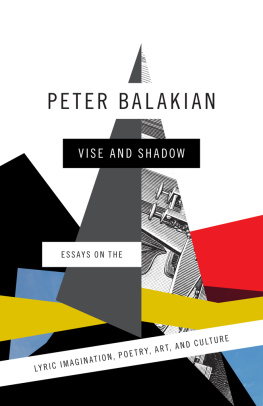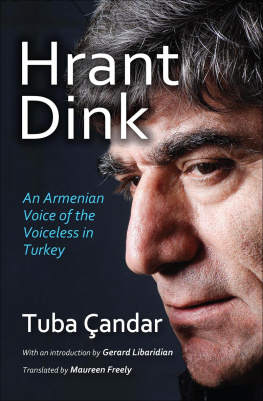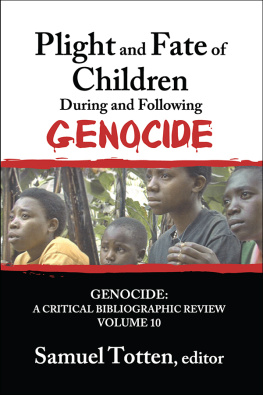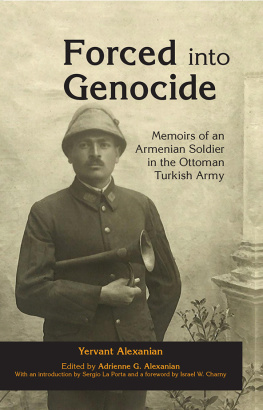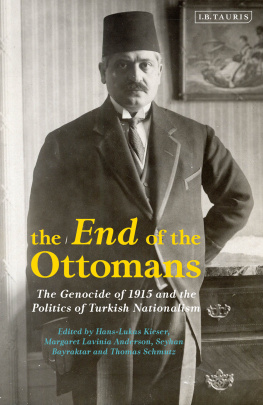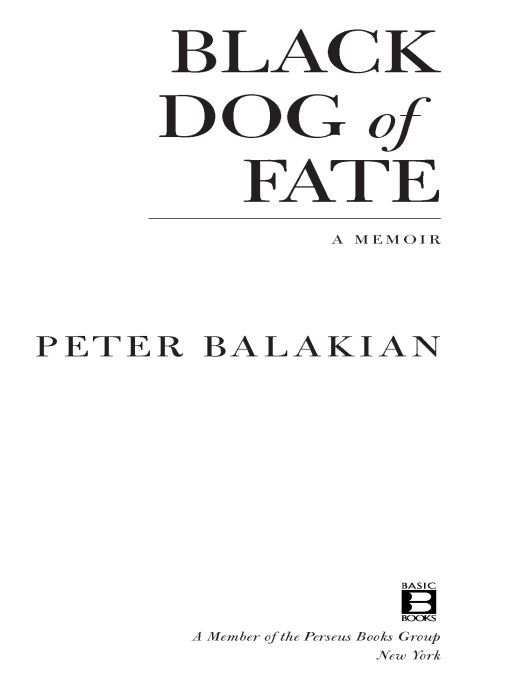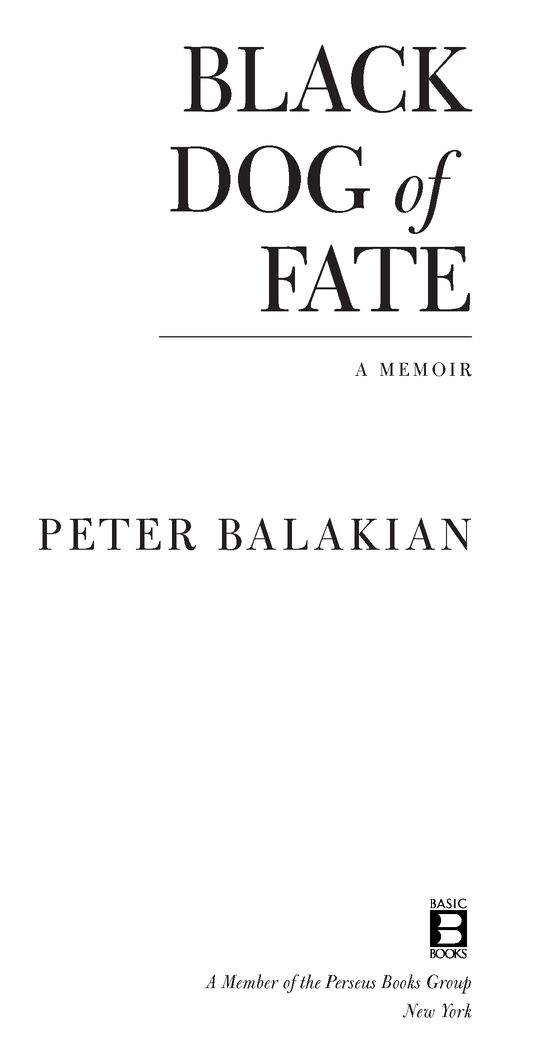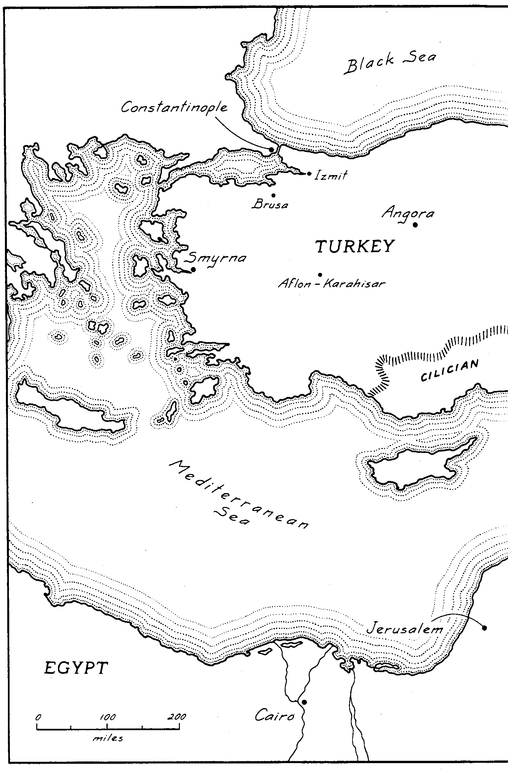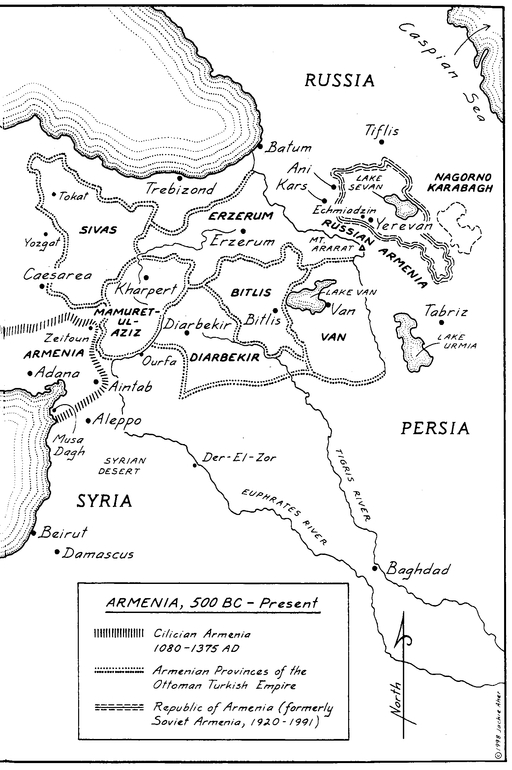Table of Contents
PRAISE FOR BLACK DOG OF FATE
[An] engrossing and poignant memoir.San Francisco Chronicle
A prose masterpiece by an acclaimed poet.... Some memoirs are compelling for the private dramas they make public, others for the historic events to which they give witness and still others for the quality of their prose and its structuring. Precious few excel at all threeNabokovs Speak, Memory remains the standard. Now Balakian ups the ante a bit, writing a memoir that not only compels in all three areas but that carries within it an urgent and timely appeal that a dark moment in world history not be revised out of existence.Publishers Weekly (starred review)
A landmark chapter in the literature of witness.... It is one of the books many triumphs that the incredible suffering endured by Balakians ancestors... finds a redeeming correlative in the touching lyricism and beauty of his style.... Out of silence he has crafted something new.Philadelphia Inquirer Book Review
[One of the] best memoirs of the summer.... Leaps from the babybooming suburbs of the 50s and 60s to the killing field of Armenia.USA Today
All the best memoirs belong to the literature of quest. They are tales of discovery, stories of finding ones way back as well as forward. Balakians Black Dog of Fate is such a book.
Houston Chronicle
Balakian writes with power and poignancy, confronting his past with justified outrage and transforming that outrage into art. An exceptional work.Library Journal (starred review)
It starts as a graceful Holden Caulfield-like memoir of youth... and ends as... a cry from the heart, transcribed with enormous literary skill that directly penetrates the readers emotions and uniquely conveys how and why the [Armenian Genocide] still grips the Armenian diaspora so ferociously.Foreign Affairs
This will be a classic among memoirs for what it tells us about the Armenian-American story, about the reclaiming of unspeakable personal and family truths, and about the emergence of a powerful poetic voice.Robert Jay Lifton
His book alternately amuses, charms, and horrifies... intimate, funny, sad, and very serious.Providence Journal
An essential American story of the authors upbringing as the child of Armenian immigrantsand of his gradual discovery of an entire cultures genocide at the hands of the Ottoman Turks in 1915.... A rare work of seasoned introspection, haunting beauty, and high moral seriousness. Includes a chilling genealogy of Balakians parents families.Kirkus (starred review)
Balakian has written a sort of Armenian Roots.... He offers a picture of a suburbia with a secret.... In the retrieved testimony of [his ancestors] we can feel a stinging reproach that the 1919 promise of international lawto say nothing of international justiceremains unkept.
Christopher Hitchens, Los Angeles Times Book Review
Balakian weaves the dark horrors of the Armenian past into his story of middle class America... a beautiful book.... Balakian has given voice to a people who were nearly destroyed and told a story that all should read.Fresno Bee
Balakian, a gifted poet, knows exactly how to bring the pain of the past into the landscape of the present. Passionate and endearingly personal... an extraordinary book.Alfred Kazin
Only once in a generation a work of literary accomplishment appears that poses the difficult questions so forcefully and succeeds in answering them with clarity and eloquence.
Journal of Holocaust and Genocide Studies
How Balakian straddles these two worlds and eventually discovers his rich and tragic heritage forms the basis of his eloquent memoir.Fort Lauderdale Sun-Sentinel
A deeply moving account of a modern American poets discovery of genocidethat of his own people, the Armenians. Balakians elegant style does not mask a burning anger over a holocaust the world has chosen to ignore.D. M. Thomas
The eldest grandson of one survivor remembers. And it honors the memory of Nafina Aroosian that Peter Balakian tells her story and his with passion and with grace.Orange County Register
This is a profound and eloquent book that traces the transmutation of a painful history into the stuff of literature and moral engagement.Mary Catherine Bateson
ALSO BY PETER BALAKIAN
Father Fisheye
Sad Days of Light
Reply from Wilderness Island
Theodore Roethkes Far Field
Dyers Thistle
Bloody News from My Friend, by Siamanto
(Translated by Peter Balakian and Nevart Yaghlian)
June-tree: New and Selected Poems, 1974-2000
The Burning Tigris:
The Armenian Genocide and Americas Response
Armenian Golgotha: A Memoir of the Armenian Genocide,
by Grigoris Balakian
(Translated by Peter Balakian with Aris Sevag)
To my children
Sophia Ann and James Gerard
PREFACE TO THE TENTH-ANNIVERSARY EDITION
When the occasion arose for a new edition to be published by Basic Books at roughly the ten-year anniversary of the first publication of Black Dog of Fate, my former editor Gail Winston, having learned of my May 2005 trip to Syria, suggested that I write another chapter for the new edition. I thought it was a good idea and one that embodied Gails affirmation of the continuation of my story, and I took her up on it.
What had been a lecture tour in Lebanon and Syria turned out to be, in a spontaneous and revelatory way, a journey into my grandmothers lost world of refuge in Aleppo from 1915 to 1920, following the death march she was put on in August 1915 by the Turkish government. From Aleppo, my trip took me to Der Zor, in the Syrian desert a couple of hundred miles east, an arid zone that had been the epicenter of death during the Armenian Genocide, a place that has come to embody perhaps what Auschwitz has come to mean to the history of the Holocaust. Thus, two chapters, Going to Aleppo, May 2005, and Bones, continue my story, and I hope that the reader will find them an organic continuation of my exploration of a dark past and a buried family narrative.
I also took the occasion to return to the text a few small things that had been cut from my earlier drafts. In Freedom, New Jersey, I returned a few paragraphs about rock n roll, including a small reflection on Bob Dylan. In Chain of Words, I gave back to my father a few words of wisdom he imparted to me. On a couple of other occasions, I identified friends with a word or two more. I have changed the spelling of Bishop Balakians name from Krikor, his given name, to Grigoris, the classical spelling of his name and the one he assumed upon his ordination and that he used in writing his books. Finally, since so much significant scholarship on the Armenian Genocide has appeared since the publication of the first edition, I have updated the bibliography with some of the important scholarly books that have been published in recent years.
P.B.


